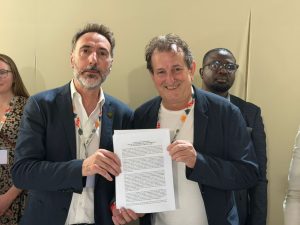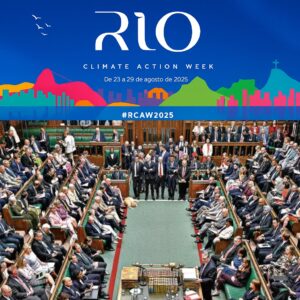The Nigerian Senate, on Wednesday, October 13, 2021, read for the second and third times, the Climate Change Bill, and passed it. The Bill had earlier been passed by the House of Representatives on July 8, 2021.
Passage of the Bill by the Senate means that all that is needed for Nigeria to have a Climate Change law is assent by President Muhammadu Buhari.
In a statement released shortly after passage of the Bill by the Senate, sponsor of the Bill and President of GLOBE Nigeria, Rep. Sam Onuigbo stressed that after the Promise of Paris, it is now time for concrete ambitious actions by governments and organizations.
“In 2021, a little over five years after the Promise of Paris, Climate Change conversations have shifted to clear-cut verifiable and ambitious actions to tackle Climate Change,” Onuigbo stated in a statement released in Abuja.
The lawmaker hopes that the President will expeditiously assent to the Bill:
“Mr. President needs to assent to the Bill as quickly as possible, in view of COP26 which the President will be a part of. Nigeria participating in COP26 with a Climate Change Act will be the country’s loudest statement of ambition.”
Key aspects of the Bill include its provision for nature-based solutions such as REDD+ and environmental-economic accounting, and the push for a net zero emissions deadline for Nigeria.
In the context of REDD+ the Bill, in section 28, provides for the establishment of REDD+ registry at sub-national levels for “capturing REDD+ activities in Nigeria, including updates on Forest Reference Emission Level (FREL).” It also makes provision for the National Council on Climate Change to provide fiscal support for REDD+ activities in Nigeria. Also, in furtherance to its projection for sustainable development anchored on climate and biodiversity responsibilities, the Bill in Section 29 provides for the development of natural capital accounts by the National Bureau of Statistics and the use of the data from the accounts in making National Development Plans.
This is the first time that a legal text mentions REDD+ and environmental economic accounting in Nigeria. These provisions were results of engagements and provision of technical support in the review and redrafting of the Bill by GLOBE Nigeria.
The passages read:
PART VII
NATURE-BASED SOLUTIONS
27. Nature-based solutions
The Council shall promote and adopt nature-based solutions to reducing GHG emissions and mitigating climate change issues in Nigeria.
28. Establishment of the REDD+ Registry
(1) The Federal Ministry responsible for Environment shall set up a registry with sub-national nodes, for capturing REDD+ activities in Nigeria, including updates on Forest Reference Emission Level (FREL).
(2) In this section, “REDD+” means Reducing Emissions from Deforestation and Forest Degradation and the role of conservation, sustainable management of forests and the enhancement of forest carbon stocks.
(3) The Council may in fulfilment of Nigeria’s climate change obligations, provide fiscal support for REDD+ activities.
29. Natural Capital Accounts and National Development Plans
(1) The Council shall collaborate with and equip the National Bureau of Statistics with developing Nigeria’s Natural Capital Accounts.
(2) The data from the Natural Capital Accounts shall be made available to MDAs, and used in policy formulation and development of Action Plans, in line with the carbon budget.
(3) The Ministry responsible for Finance, Budget, and National Planning shall ensure that the data referred to in subsection (2) of this section is captured in the National Development Plan and expenditure framework, as a means of measuring the impact of climate change on sustainable development.







